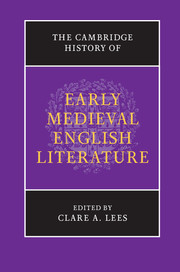Book contents
- Frontmatter
- Contents
- List of Illustrations
- List of Contributors
- Acknowledgements
- List of Abbreviations
- Introduction: literature in Britain and Ireland to 1150
- I WORD, SCRIPT AND IMAGE
- II EARLY ENGLISH LITERATURE
- 7 Across borders: Anglo-Saxon England and the Germanic world
- 8 English literature in the ninth century
- 9 The writing of history in the early Middle Ages: the Anglo-Saxon Chronicle in context
- 10 The literary languages of Old English: words, styles, voices
- 11 Old English poetic form: genre, style, prosody
- 12 Beowulf: a poem in our time
- 13 Old English lyrics: a poetics of experience
- 14 Literature in pieces: female sanctity and the relics of early women’s writing
- 15 Saintly lives: friendship, kinship, gender and sexuality
- 16 Sacred history and Old English religious poetry
- 17 Performing Christianity: liturgical and devotional writing
- 18 Riddles, wonder and responsiveness in Anglo-Saxon literature
- III LATIN LEARNING AND THE LITERARY VERNACULARS
- Bibliography
- Index of manuscripts
- Index
18 - Riddles, wonder and responsiveness in Anglo-Saxon literature
from II - EARLY ENGLISH LITERATURE
Published online by Cambridge University Press: 05 February 2013
- Frontmatter
- Contents
- List of Illustrations
- List of Contributors
- Acknowledgements
- List of Abbreviations
- Introduction: literature in Britain and Ireland to 1150
- I WORD, SCRIPT AND IMAGE
- II EARLY ENGLISH LITERATURE
- 7 Across borders: Anglo-Saxon England and the Germanic world
- 8 English literature in the ninth century
- 9 The writing of history in the early Middle Ages: the Anglo-Saxon Chronicle in context
- 10 The literary languages of Old English: words, styles, voices
- 11 Old English poetic form: genre, style, prosody
- 12 Beowulf: a poem in our time
- 13 Old English lyrics: a poetics of experience
- 14 Literature in pieces: female sanctity and the relics of early women’s writing
- 15 Saintly lives: friendship, kinship, gender and sexuality
- 16 Sacred history and Old English religious poetry
- 17 Performing Christianity: liturgical and devotional writing
- 18 Riddles, wonder and responsiveness in Anglo-Saxon literature
- III LATIN LEARNING AND THE LITERARY VERNACULARS
- Bibliography
- Index of manuscripts
- Index
Summary
Day, speech, moon, time, dream, true dream, death, cloud, word, letter and comet: each has been proposed as a possible solution for Riddle 39 of the Exeter Book. When an Anglo-Saxon riddle states, ‘Saga hwæt ic hatte’ [Say what I am called], or a Latin prose riddle urges, ‘Dic mihi quae est illa res’ [Tell me what that thing is], they perform, in a discursive way, what all riddles effectuate implicitly on a broader scale: riddles produce responsiveness in their audiences, even if they do not explicitly ask the reader to name the object in question. Whether the response is voiced in an ‘oral’ context or in a ‘literary’ one (however problematic that distinction may be), as John Niles has underscored, ‘Poetry, like riddling, presents itself rhetorically as a public and interactive form of communication even when we encounter it on the manuscript page.’ Even though particular responses to riddles will be considered in this chapter, my emphasis here is on responsiveness as a category in and of itself, both in the Exeter Book and in other Anglo-Saxon poetry and prose, in order to explore what a response may effectuate, in addition to producing an answer. Like charms, a genre of Old English poetic writing with which the riddles are often associated, riddles encourage speech and vocalization; and like wonders, riddles play on the relation between the intangible and the familiar. Because the rhetorical style of enigmata or riddles is, by definition, a style that relies upon obfuscation and, in the case of Old English riddles, overarchingly ascribes a sense of the mysterious and wondrous (‘Ic eom wunderlicu wiht’ [I am a wondrous creature], Riddle 25) to even the most common of objects, my aim is to explore what, if any, pedagogic ends making something unfamiliar might serve in cultivating response, in addition to the simple rhetorical fact of veiling a thing known.
- Type
- Chapter
- Information
- The Cambridge History of Early Medieval English Literature , pp. 451 - 472Publisher: Cambridge University PressPrint publication year: 2012
- 2
- Cited by



